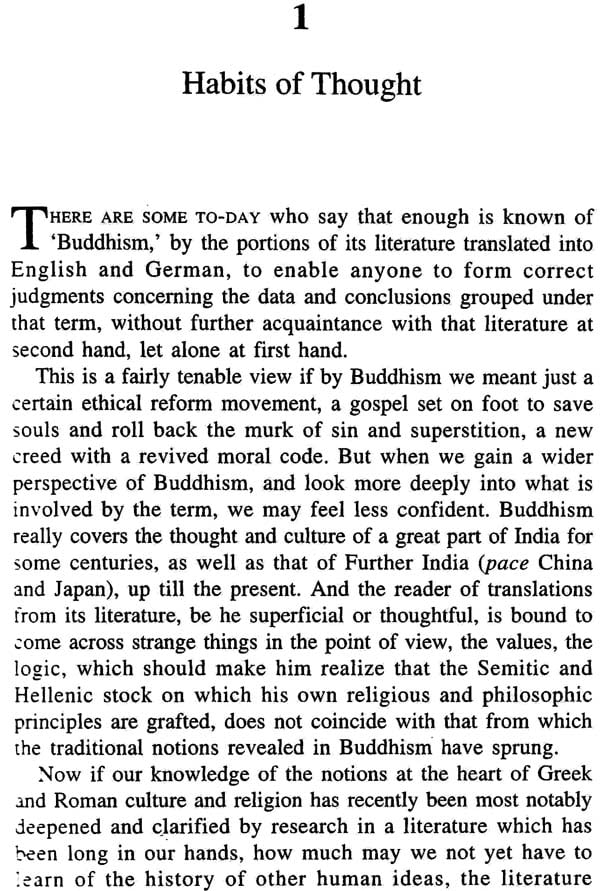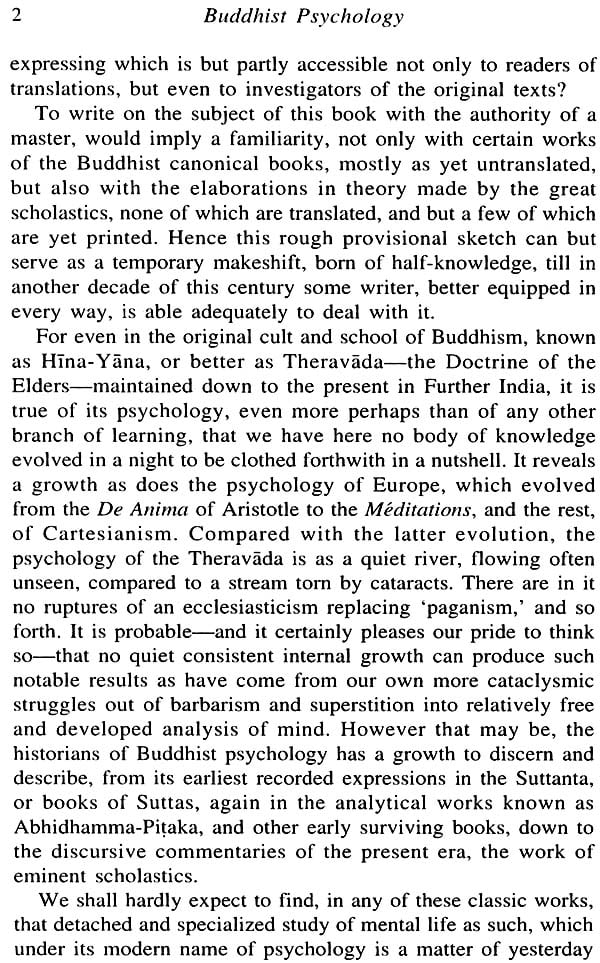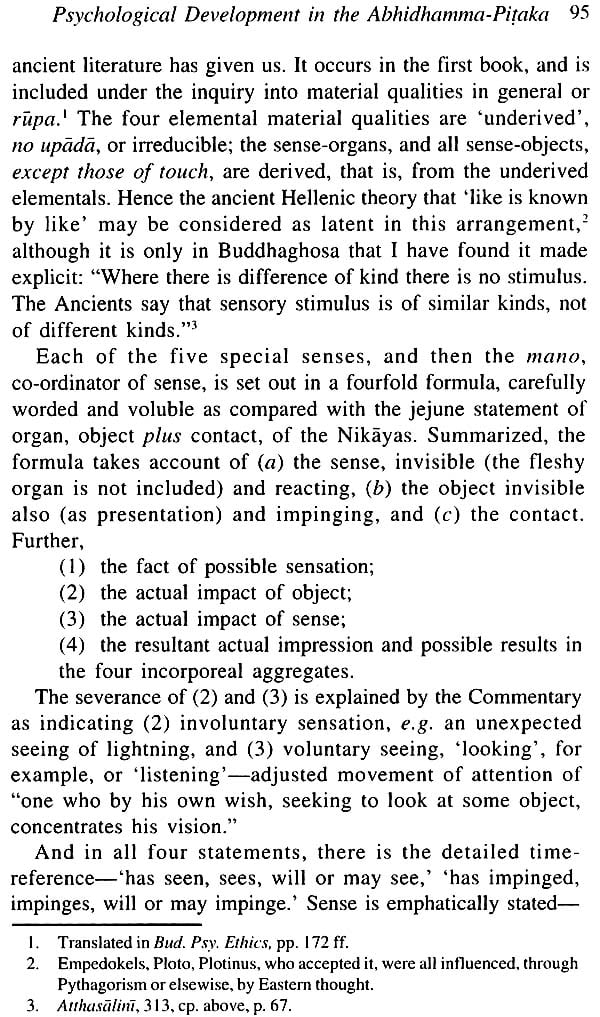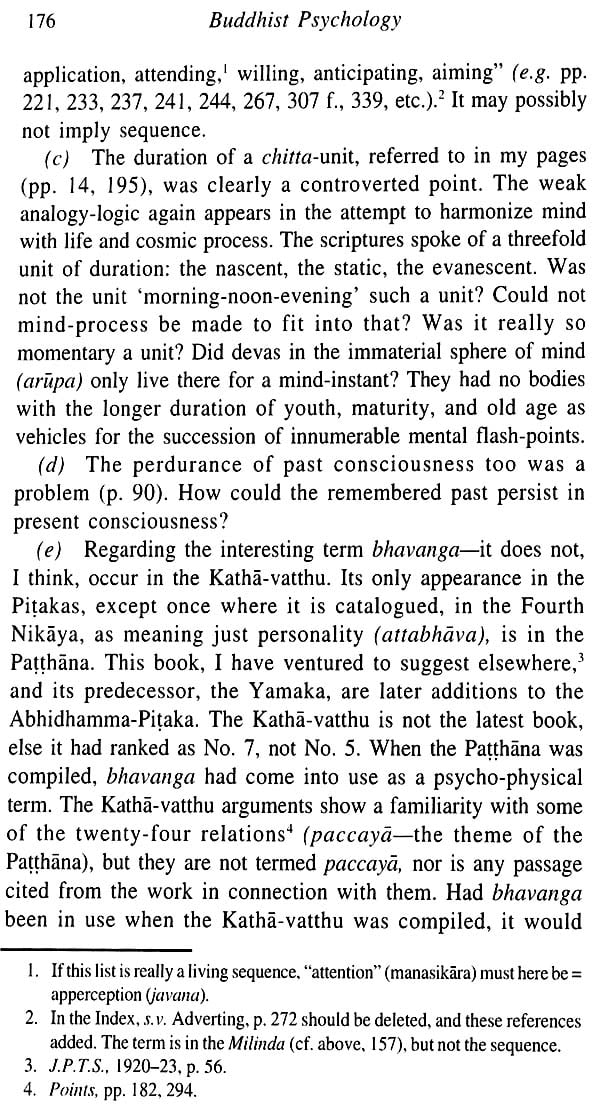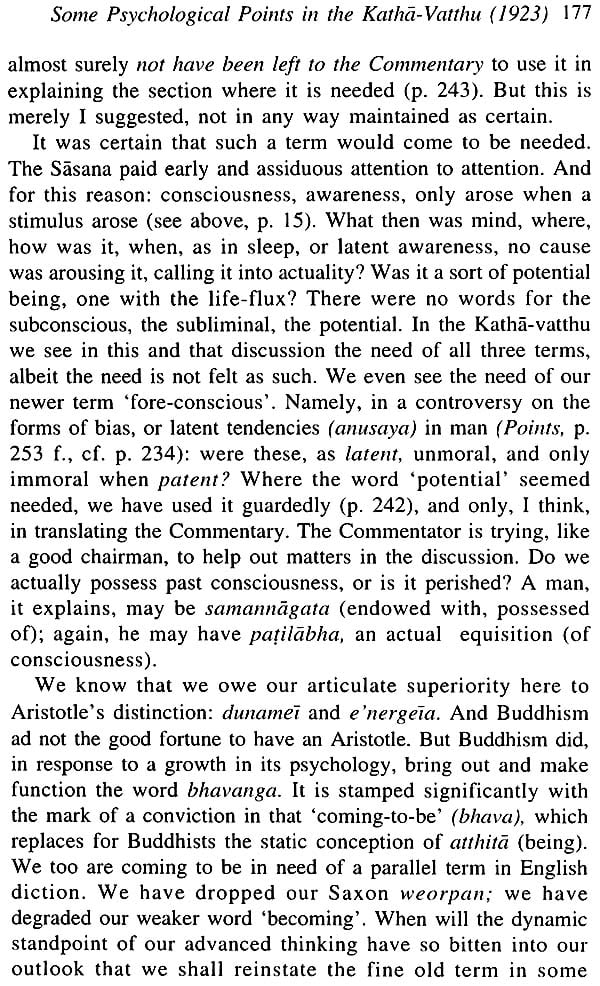
Buddhist Psychology (An Inquiry into the Analysis and Theory of Mind in Pali Literature)
Book Specification
| Item Code: | NAP566 |
| Author: | C. A. F. Rhys Davids |
| Publisher: | Eastern Book Linkers |
| Language: | English |
| Edition: | 2017 |
| ISBN: | 9788178543277 |
| Pages: | 210 |
| Cover: | Hardcover |
| Other Details | 9.0 inch X 6.0 inch |
| Weight | 390 gm |
Book Description
The book is an attempt to envisage faithfully something true in the history of a very interesting current in human ideas. This `something true' is the analysis and theory of mind in the movement and culture we understand by Early Buddhism, as well as in that of its direct descendant still thriving in Burma, Ceylon and Siam, called Theravada, or the Doctrine of the Elders. This also is called Buddhism—some call it I-fin-Yana, some Southern Buddhism.
While scholars are beginning to get at and decipher the long-buried treasure of Buddhist writings brought from Mid-Asia, the general reader is being told that the group of other descendants from Early Buddhism called Maha-Yanism, is not only evolved from the earlier doctrine, but is its completion and apotheosis.
The second object is to bring nearer the day when the historical treatment of psychology will find it impossible to pretend that the observation and analysis of mind began with the Pre-Socratics. Psychologists are, some of them, curiously unhistorical, even with regard to the European field with its high fence of ignorance and prejudice.
With so large an object in so small a book, it has been impossible to compare the line of descent I have chosen with other lines, even with that of the Madhyamika school, in which Professor de la Vallee Poussin has revealed much interesting psychological matter. I have also to apologize for bringing in several terms in the original. This was as inevitable, for clearness and unambiguity, as would be the use of corresponding Greek words in writing on Greek psychology. But we are more used to Greek words. Finally, if I have repeated statements made in previous writings, it was to avoid irritating the reader by too many references, as if suggesting that he might as well be reading not one book, but three or four.
My book is an attempt to envisage faithfully something true in the history of a very interesting current in human ideas. This 'something true' is the analysis and theory of mind in the movement and culture we understand by Early Buddhism, as well as in that of its direct descendant still thriving in Burma, Ceylon and Siam, called Theravada, or the Doctrine of the Elders. This also is called Buddhism—some call it Hina-Yana, some Southern Buddhism.
As to the book's quests and goals, two of the more proximate may suffice. While scholars are beginning to get at and decipher the long-buried treasure of Buddhist writings brought from Mid-Asia, the general reader is being told that the group of other descendants from Early Buddhism called Maha-Yanism, is not only evolved from the earlier doctrine, but is its completion and apotheosis. The reader cannot judge in this matter, unless he has an all-round knowledge of what the developed system started from. Such knowledge is not always present in those who are fluent about the complete descendant. Hence he is placed in the position of one who learns of Neo-Platonism and not of Plato, of Aquinas and not of Aristotle. My book's quest is to present summarily some of the thought contained in the mother-doctrine and her first-born child, much of which is still inaccessible to him.
The second object is to bring nearer the day when the historical treatment of psychology will find it impossible to pretend that the observation and analysis of mind began with the Pre-Socratics. Psychologists are, some of them, curiously Unhistorical, even with regard to the European field with its high fence of ignorance and prejudice. The stories are sometimes put forward as new that have been anticipated in both Europe and Asia. I say 'curiously,' because the history of ideas about the mind is both fascinating and suggestive. Would Professor Bergson say of his brother thinkers, too, especially of the more constructive among them (I dare to include himself), that the past of psychological thought also, continuellement, but that so intent is their forward gaze that they 'cannot and must not look back'? Yet how much more impressive might they not make the present for us if they would, if they felt compelled to look back a little more! Let us hope that monographs in psychological history may eventually succeed in making it unnecessary for drowning, or other catastrophes, to bring flooding in upon them the ignored past of ideas in Indian philosophy.
With so large an object in so small a book, it has been impossible to compare the line of descent I have chosen with other lines, even with that of the Madhyamika school, in which Professor de la Vallee Poussin has revealed much interesting psychological matter. I have also to apologize for bringing in several terms in the original. This was as inevitable, for clearness and unambiguity, as would be the use of corresponding Greek words in writing on Greek psychology. But we are more used to Greek words. Finally, if I have repeated statements made in previous writings, it was to avoid irritating the reader by too many references, as if suggesting that he might as well be reading not one book, but three or four.
Contents
| Preface | v | |
| 1 | Habits of Thought | 1 |
| 2 | The Psychology of the Nikayas | 8 |
| I | Mind in term and concept | |
| 3 | The Psychology of the Nikayas—Continued | 26 |
| II | Consciousness and the external world | |
| 4 | The Psychology of the Nikayas—Continued | 49 |
| III | Feeling | |
| 5 | The Psychology of the Nikayas—Continued | 58 |
| IV | Ideation | |
| 6 | The Psychology of the Nikayas—Continued | 80 |
| V | Ideation | |
| 7 | Psychological Developments in the Abhidhamma-Pitaka | 89 |
| 8 | Psychology in the Milinda | 103 |
| 9 | Some Mediaeval Developments | 114 |
| SUPPLEMENTARY CHAPTERS | ||
| 10 | The Buddhist Principle of Change (1917) | 137 |
| 11 | The Buddhist Doctrine of Rebirth (1921) | 158 |
| 12 | Some Psychological Points in the Katha-Vauhu (1923) | 174 |
| 13 | Development of the Anti-Soul Attitude | 181 |
| Epologue | 193 | |
| Bibliography | 197 | |
| Index | 199 |
Sample Pages
